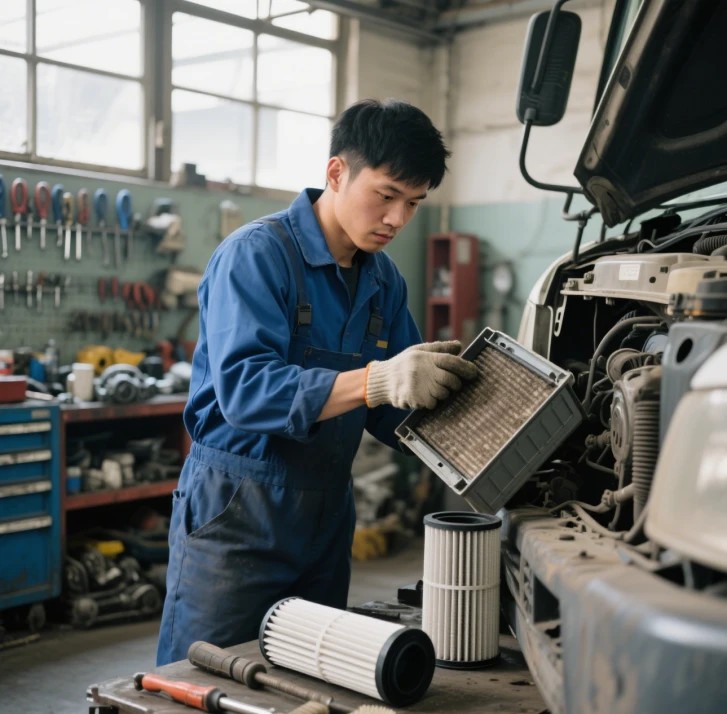In the bustling realm of commercial transportation, your vehicle serves as the lifeblood of your business. Consistent daily maintenance is the linchpin to avoid expensive breakdowns, minimize downtime, and boost your return on investment. Whether you're in charge of a heavy-duty truck, a delivery van, or a specialized commercial vehicle, these maintenance tips—backed by real-world case studies—will keep your rig running smoothly.

The Multifaceted Roles of Filters
Filters in commercial vehicles are not just simple components; they are guardians of your engine, transmission, and other vital systems. Their primary function is to prevent contaminants such as dirt, dust, debris, water, and harmful particles from entering sensitive areas of your vehicle. Here’s a closer look at the different types of filters and their specific roles:
Air Filters: Breathing Life into Your Engine
The air filter is the first line of defense for your engine. It ensures that only clean air enters the combustion chamber, where it mixes with fuel to produce power. Without a properly functioning air filter, contaminants can enter the engine, causing excessive wear and tear on critical components such as pistons, cylinders, and valves. This can lead to reduced engine performance, decreased fuel efficiency, and costly repairs down the line. Regularly replacing your air filter is essential, especially if you operate your vehicles in dusty or dirty environments.
Fuel Filters: Protecting Your Fuel System
Fuel filters are designed to remove impurities from the fuel before it reaches the engine. Contaminants in the fuel can damage fuel injectors, fuel pumps, and other components of the fuel system, leading to poor engine performance, rough idling, and even engine failure. By filtering out these contaminants, fuel filters help ensure that your engine receives clean, high-quality fuel, which is essential for optimal performance and efficiency.

Oil Filters: Keeping Your Engine Lubricated
Oil filters play a crucial role in maintaining the health of your engine by removing contaminants from the engine oil. As the engine operates, the oil picks up dirt, metal shavings, and other particles, which can cause excessive wear and tear on engine components. Oil filters trap these contaminants, preventing them from circulating through the engine and causing damage. Regularly changing your oil and oil filter is essential for keeping your engine properly lubricated and extending its lifespan.

The Consequences of Neglecting Filter Maintenance
Neglecting filter maintenance can have serious consequences for your commercial vehicles. Here are some of the potential risks and costs associated with filter neglect:
•Reduced Performance and Efficiency: Contaminated filters can restrict the flow of air, fuel, and oil, leading to reduced engine performance, decreased fuel efficiency, and increased emissions. This can result in higher fuel costs, longer delivery times, and decreased productivity.
•Increased Maintenance and Repair Costs: Contaminants that enter your vehicle’s systems can cause excessive wear and tear on critical components, leading to costly repairs and replacements. Regularly replacing your filters can help prevent these issues and extend the lifespan of your vehicles, saving you money in the long run.
•Downtime and Lost Revenue: A breakdown or malfunction caused by filter neglect can result in costly downtime for your fleet. This can lead to missed deliveries, lost contracts, and decreased customer satisfaction. By investing in regular filter maintenance, you can minimize the risk of breakdowns and keep your vehicles on the road, maximizing your revenue and profitability.
Tips for Maintaining Your Filters
To ensure the optimal performance and longevity of your commercial vehicles, it’s important to follow a regular filter maintenance schedule. Here are some tips to help you keep your filters in top condition:
•Follow the Manufacturer’s Recommendations: Consult your vehicle’s owner’s manual or the manufacturer’s guidelines for the recommended filter replacement intervals. These intervals may vary depending on the type of vehicle, driving conditions, and filter type.
•Inspect Filters Regularly: In addition to following the recommended replacement intervals, it’s a good idea to inspect your filters regularly for signs of wear and tear. Look for signs of dirt, debris, or clogging, and replace the filter if necessary.
•Choose High-Quality Filters: When replacing your filters, choose high-quality filters from a reputable manufacturer. High-quality filters are designed to provide superior filtration, durability, and performance, ensuring the optimal protection of your vehicle’s systems.
•Train Your Ability: Educate your drivers about the importance of filter maintenance and how to recognize the signs of a dirty or clogged filter. Encourage them to report any issues or concerns with the vehicle’s performance or filters as soon as possible.
Leave A Message
